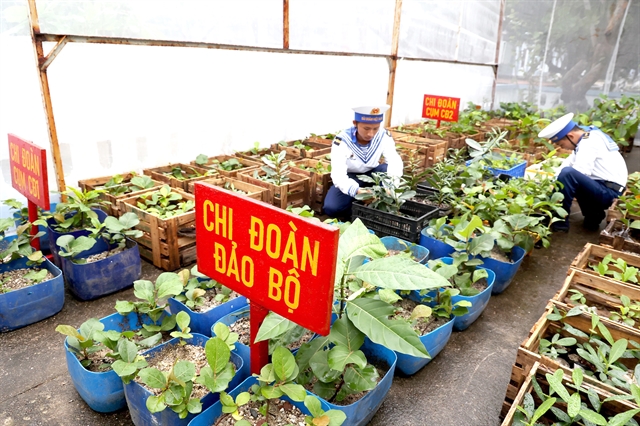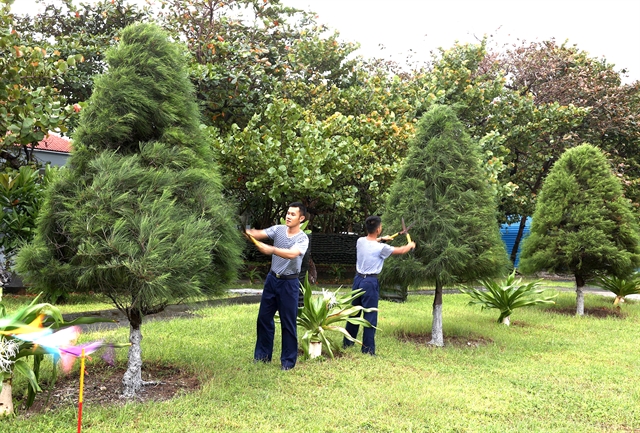 Society
Society

 |
| Soldiers on Trường Sa Islands care for seedlings before planting them on the island. — VNA/VNS Photos Hồng Đạt |
TRƯỜNG SA ISLANDS — The application of science and technology in farming has brought vibrant greenery to trees and vegetable gardens, breathing new life into an environment where harsh weather conditions pose challenges for both residents and soldiers across the Trường Sa (Spratly) Islands.
The presence of fresh greens in the daily meals of soldiers stationed in the islands has gradually been assured, with almost no reliance on ships ferrying vegetables from the mainland to the islands, Nhân Dân (The People) newspaper reported.
This accomplishment is credited to the soldiers' adept application of agricultural experience, honed over several years of implementing advanced farming techniques. Many Trường Sa soldiers hail from farming backgrounds, and are showcasing their adaptability and innovative application of highly effective agricultural practices for year-round vegetable harvesting.
For both the military and residents on the islands, rainwater is a crucial resource.
However, not many people are aware that rainwater over the ocean contains a certain amount of salt, which can harm the growth of vegetables.
The islands' soldiers have found a method to harvest rainwater that effectively removes salt content.
They use large barrels or, in a simpler approach, dig a pit in the ground and line the bottom with a nylon sheet to collect rainwater. Over time, these barrels and water pits host various mosses, algae and microorganisms that neutralise the salt content in the rainwater.
This serves as the primary irrigation source for plants, especially short-term vegetables.
"For successful cultivation, besides soil improvement and sufficient fertiliser supply, daily irrigation with fresh water is crucial. Depending on the season and weather, we store an adequate amount of fresh water to meet the needs of the military, and any excess water is utilised for irrigating the vegetables," Lieutenant Colonel Trần Văn Trình said.
Originating from the need to create more arable land on the Trường Sa Islands, the centre for monitoring and environmental analysis under the Naval Command is currently undertaking the project of transforming coral sand into planting soil on Sinh Tồn Island.
To create arable land, the soldiers combine coconut husk, sawdust, and leaves with sand, forming soil enriched with organic matter. Many types of vegetables planted in this soil have shown better growth compared to normal soil.
Lieutenant Lê Đại Dương from Combat Group 3, said: "In the concentrated cultivation area, various plants tested on the reclaimed soil have shown quite positive results, exhibiting healthier growth than those in the normal planting area."
Soldiers also choose to cultivate vegetables most suitable to the terrain and seasonal climate of each island.
On smaller islands like Đá Thị, Cô Lin, Len Đao, soldiers carefully collect soil from the mainland, making use of items such as buckets, pots, plastic containers and composite pots to nurture and grow vegetables.
Vegetable gardens and concentrated cultivation areas are enclosed to protect against salty sea winds.
With the dedicated efforts of the military, the vegetable gardens become greener.
On Đá Thị Island, there are three vegetable gardens with a total area of 78sq.m. Various types of vegetables are cultivated here, including mustard greens, water spinach and eggplant.
Cô Lin Island also has a 78sq.m vegetable garden, yielding 725kg in 2023, ensuring a basic supply of fresh vegetables for the military's meals.
Taking care of the vegetable gardens also brings joy to each island soldier.
These gardens on small islands are enclosed with tarpaulin sheets on all four sides to shield them from the wind, with a plastic covering on top to allow sufficient light for plant growth.
This can be considered a standard for growing vegetable gardens on small islands.
 |
| Soldiers prune trees planted in the central area of the island. |
In addition to the vegetable gardens, the soldiers also utilise all wind-sheltered and sunny corners to grow various herbs, supplementing their daily diet with an abundant supply of fresh vegetables.
Lieutenant Nguyễn Quang Vinh, who is passionate about the vegetable growing project, said: "To counteract the movement of sand, we plant some trees that can withstand the sun and sea wind to create a barrier. Next, we plant species that provide moisture to the soil. When we have successfully retained the sand, we will add organic matter to enrich the soil."
On Song Tử Tây Island, soldiers nurture seedlings from seeds or branches to supply other islands and bring greenery to the island. Major Đào Xuân Nam, the commander of Song Tử Tây Island, said that Typhoon No 9 swept through the island in 2021, breaking or uprooting 80 per cent of the plants.
"After the storm, the soldiers carefully replanted each fallen plant and added new ones. Particularly, post-typhoon, seawater inundated the island, resulting in saline soil. We had to wait for rain to wash the soil and trees. Luckily, the plants turned green again."
"We have recently received 22,000 seedlings from the mainland and have placed them in the nursery to acclimate to the island's climate and soil conditions," Nam said.
A resolution of the Party Committee of the Naval Region 4 on "Greening Trường Sa" has achieved impressive initial results after more than a year of implementation.
Currently, over 80 per cent of the area suitablefor long-term planting on the islands is covered with greenery.
Each time an officer or soldier is assigned to work on the island, they plant from five to 10 trees.
The implementation of the resolution on "Greening Trường Sa" is also a criterion for evaluating the results of the mission for all island officials and Party members, as well as the basis for commendation and reward for units.
Thanks to the conveyed experience of the military, households on Song Tử Tây and Sinh Tồn islands are self-sufficient in providing enough vegetables throughout the year, even during dry season with water shortages.
Many families not only have enough vegetables for themselves but also have surplus to sell to fishing boats operating on the sea for an extended period. — VNS




